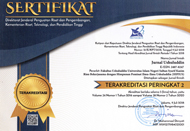Traditionalist and Revisionist Madzhabs’ Perspectives Against the Sunni Hadith Criticism Method and Refutation
Abstract
Keywords
Full Text:
PDFReferences
Abdul Muttalib, R. F. (1981). Tausiq al-Sunnah fi al-Qarn al-Sani al-Hijri: Ususuhu wa Ittijahatuhu. Cairo: Maktabah al-Khanji.
Agustiono, I. (2020). Potret Perkembangan Metodologi Kelompok Orientalis dalam Studi Al-Qur’an. Studia Quranika, 4(2), 159–180. http://dx.doi.org/10.21111/studiquran.v4i2.3819
Ahmad, G. (2016). The Statuse of Hadeeth in Islam, Through The Quranic and Historical Perspective. Lahore: Tolu-e.
Akmaluddin, M. (2021). Pembuktian Empiris dan Validasi Alternatif dalam Kajian Hadis Kontemporer. Mutawatir: Jurnal Keilmuan Tafsir Hadis, 11(2), 231–252. https://doi.org/10.15642/mutawatir.2021.11.02.231-252
Amin, A. (1975). Fajr al-Islam: Kitab fi Thalatha Ajza’ Yabḥath ‘an al-Ḥalat al-‘Aqliyya wa al-Siyasiyya wa al-Adabiyya fī Ṣadr al-Islām ila Akhir al-Dawlat al-Umawiyya. Beirut: Dar al-kitab al-‘Arbi.
Amir, A. N. (2022). Interpreting the Qur’an: Fazlur Rahman’s Social Exegesis. Journal of Multidisciplinary Islamic Studies, 2(1), 15–19.
Brown, D. (1996). Rethinking Tradition in Modern Islamic Thought. Cambridge: Cambridge University Press.
Burton, J. (1977). The collection of the Quran. Cambridge: Cambridge University Press.
Faizin, H. (2011). Kritik Matan Hadis Menurut James Robson. Jurnal Studi Ilmu-Ilmu Al-Qur’an Dan Hadis, 12(1), 84–114.
Hasan, F. (2016). Telaah Kritis Atas Pemikiran Zakaria Ouzon. Millati: Journal of Islamic Studies and Humanities, 1(2), 209–226. https://doi.org/10.18326/mlt.v1i2.209-226
Ilahi Bahsy, K. H. (2000). Al-Qur’aniyyun wa Syubhatuhum haula al-Sunnah. Saudi Arabia: Maktabah al-Siddiq.
Isma’il, S. (1995). Kaedah Kesahehan Sanad Hadits, Telaah Kritis dan Tinjauan dengan Pendekatan Sejarah. Jakarta: PT. Bulan Bintang.
Kurahman, T. (2022). Rasionalitas Barat dan Pengaruhnya Terhadap Studi Hadis. Tajdid, 21(1), 1–25. https://doi.org/10.30631/tjd.v21i1.221
Mufid, A. (2019a). Menimbang Interpretasi Hadis Rukyat Hilal Yusuf al-Qaradawi. Mutawatir: Jurnal Keilmuan Tafsir Hadis, 9(1). https://doi.org/10.15642/mutawatir.2019.9.1.146-169
Mufid, A. (2019b). Unifikasi Kalender Hijriah Internasional dalam Perspektif Yusuf Al-Qaradawi. 5(1), Hikmatuna: Journal for Integrative Islamic Studies. https://doi.org/10.28918/hikmatuna.v5i1.1856
Musa, A. Y. (2008). Hadith As Scripture, Discussions on the Authority of Prophetic Traditions in Islam. London: Mcmillan.
Naqiyah. (2021). A Tafseer Study on Qur’an Reading in the Tradition of the Banyumas Muslim Community of Indonesia. Ibda’: Jurnal Kajian Islam Dan Budaya, 19(1), 190–204. https://doi.org/10.24090/ibda.v19i1.4719
Qorib, M. (2017). Ahmad Syafii Maarif: Kajian Sosial-Intelektual dan Model Gagasan Keislamannya. Intiqad: Jurnal Agama Dan Pendidikan Islam, 9(2), 50–65. http://dx.doi.org/10.30596%2Fintiqad.v9i2.1383
Rafif, A. A. (2021). Counter Discourse on the Idea of Islamic State and Formalization of Religion in the Qur’anic Exegesis of KH. Abdurahman Wahid. Jurnal Studi Ilmu-Ilmu Al-Qur’an Dan Hadis, 22(2), 427–448. https://doi.org/10.14421/qh.2021.2202-08
Rayyah, M. A. (1965). Shaykh al-Muḍira Abu Hurairah. Cairo: Dar al-Maʻarif.
Rayyah, M. A. (1999). Aḍwaʼ ʻala al-Sunnah al-Muḥammadīyyah. Qom: Ansariyan.
Salih, S. (1977). Ulum al-Hadis wa Mustalahuhu. Beirut: Dar al-Ilm li al-Malayin.
Siba’i, M. (2006). Al-Sunnah wa Makanatuha fi al-Tasyri’ al-Islami. Cairo: Dar al-Waraq.
Syahrur, M. (2012). Al-Sunnah al-Rasuliyyah wa al-Sunnah al-Nabawiyyah. Beirut: Dar al-Saqi.
Syirbini, I. S. (2001). Kitabat A’da’ al-Islam Haula al-Sunnah wa Munaqasyatuha. Cairo: Dar al-Kutub al-Masriyyah.
Yamani, A. (1981). Al-Anwar al-Kasyifah Lima fi Kitab Aḍwa’ ‘ala al-Sunna min Zulal wa al-Taḍlil wa al-Mujazafa. Beirut: Alam al-Kutub.
Zahw, M. A. (1983). Al-Hadis wa al-Muhaddisun. Riyad: Syirkah al-Tiba’ah al-Su’udiyyah.
DOI: http://dx.doi.org/10.24014/jush.v31i1.21470
Refbacks
- There are currently no refbacks.
 Jurnal Ushuluddin Indexed By:
Jurnal Ushuluddin Indexed By:
Alamat Redaksi:
 Fakultas Ushuluddin UIN SUSKA Riau Jl. H.R. Soebrantas KM. 15,5 Panam – Pekanbaru
Fakultas Ushuluddin UIN SUSKA Riau Jl. H.R. Soebrantas KM. 15,5 Panam – Pekanbaru
 E-mail: jurnal.ushuluddin@uin-suska.ac.id
E-mail: jurnal.ushuluddin@uin-suska.ac.id
ejournal: http://ejournal.uin-suska.ac.id/index.php/ushuludin

Jurnal Ushuluddin is licensed under a Lisensi Creative Commons Atribusi 4.0 Internasional.

















